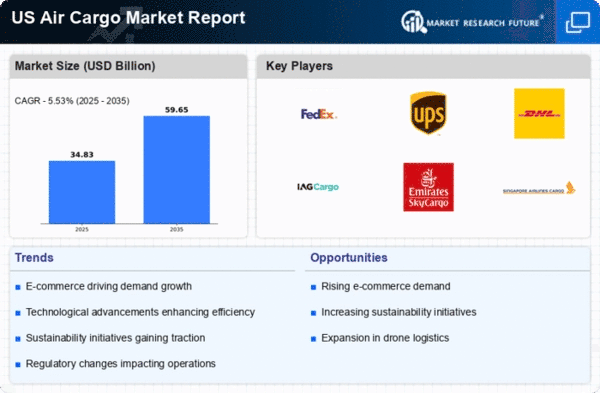Rising Demand for Fast Delivery
The air cargo market is experiencing a notable increase in demand for expedited shipping services. This trend is largely driven by consumer expectations for rapid delivery, particularly in the e-commerce sector. As online shopping continues to flourish, businesses are compelled to enhance their logistics capabilities to meet customer needs. In 2025, the air cargo market is projected to account for approximately 35% of total freight transport, reflecting a shift towards faster delivery methods. Companies are investing in air freight solutions to ensure timely delivery of goods, which is crucial for maintaining competitive advantage. This rising demand for fast delivery is likely to propel growth in the air cargo market, as businesses seek to optimize their supply chains and improve customer satisfaction.
Expansion of E-commerce Platforms
The proliferation of e-commerce platforms is significantly influencing the air cargo market. As more consumers turn to online shopping, the volume of goods transported via air freight is expected to rise. In 2025, e-commerce sales in the US are anticipated to reach $1 trillion, creating a substantial demand for efficient logistics solutions. This growth necessitates the use of air cargo services to facilitate quick and reliable delivery. Retailers are increasingly partnering with air freight carriers to streamline their operations and ensure that products reach customers promptly. The expansion of e-commerce platforms is thus a critical driver for the air cargo market, as it fosters a need for enhanced shipping capabilities and logistics infrastructure.
Regulatory Changes and Trade Policies
Regulatory changes and evolving trade policies are influencing the dynamics of the air cargo market. The US government is actively revising trade agreements and customs regulations, which can impact the flow of goods across borders. In 2025, the air cargo market was expected to adapt to these changes, as businesses navigated new compliance requirements. Enhanced trade facilitation measures may streamline customs processes, potentially reducing transit times for air freight. Conversely, stricter regulations could pose challenges for carriers, necessitating adjustments in operational strategies. The air cargo market must remain agile in response to these regulatory shifts. These shifts play a crucial role in determining the efficiency and cost-effectiveness of air freight services.
Increased Investment in Infrastructure
Investment in logistics infrastructure is a pivotal factor shaping the air cargo market. The US government and private sector are allocating substantial resources to modernize airports and cargo facilities. In 2025, it is estimated that infrastructure spending will exceed $100 billion, aimed at enhancing capacity and efficiency in air freight operations. Improved infrastructure facilitates faster processing times and reduces delays, which are essential for meeting the demands of the air cargo market. Additionally, advancements in technology, such as automated handling systems, are being integrated into these facilities, further optimizing operations. This increased investment in infrastructure is likely to bolster the air cargo market by enabling carriers to handle larger volumes of freight more effectively.
Technological Integration in Logistics
Advanced technologies are transforming the air cargo market. Innovations such as artificial intelligence, blockchain, and IoT are being adopted to enhance operational efficiency and transparency. In 2025, it is projected that 60% of air cargo companies will implement AI-driven solutions to optimize routing and inventory management. This technological integration not only improves the speed and accuracy of shipments but also enhances tracking capabilities, providing real-time visibility to customers. As the air cargo market embraces these technologies, it is likely to experience increased efficiency and reduced operational costs, ultimately benefiting both carriers and shippers.
















